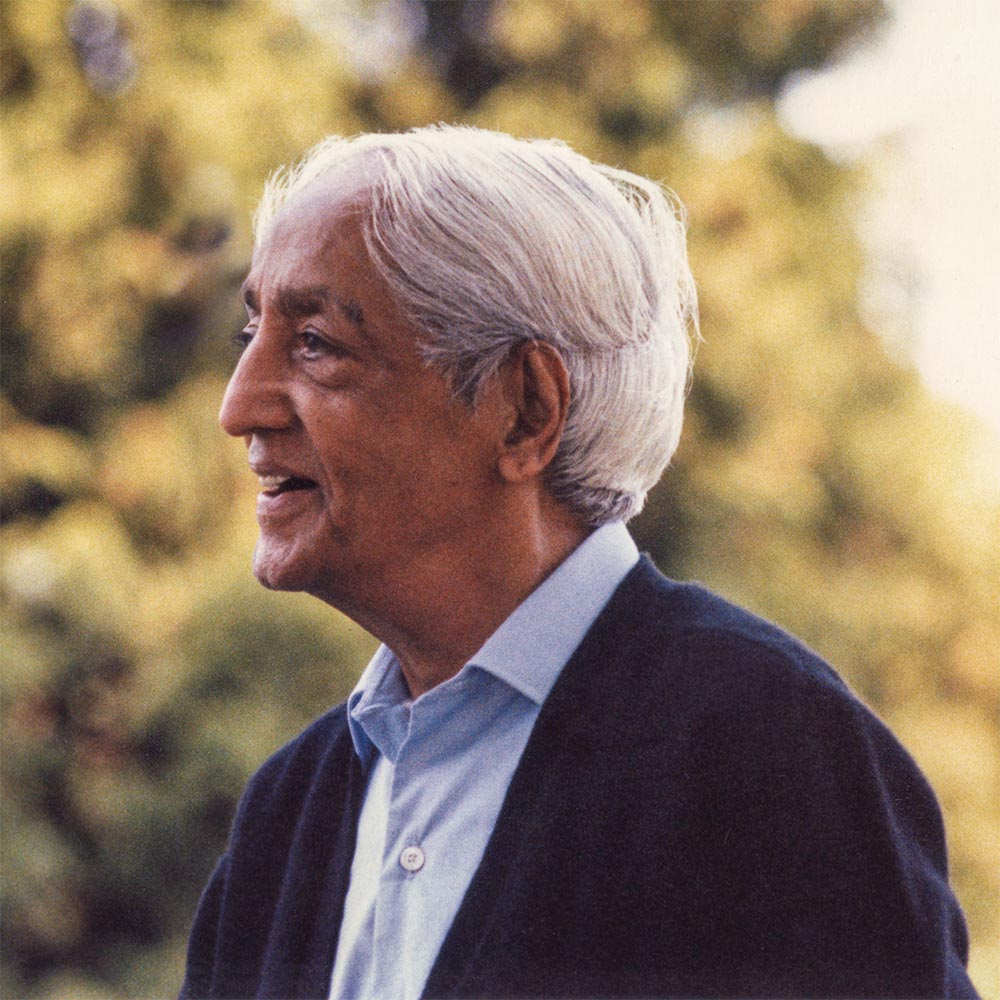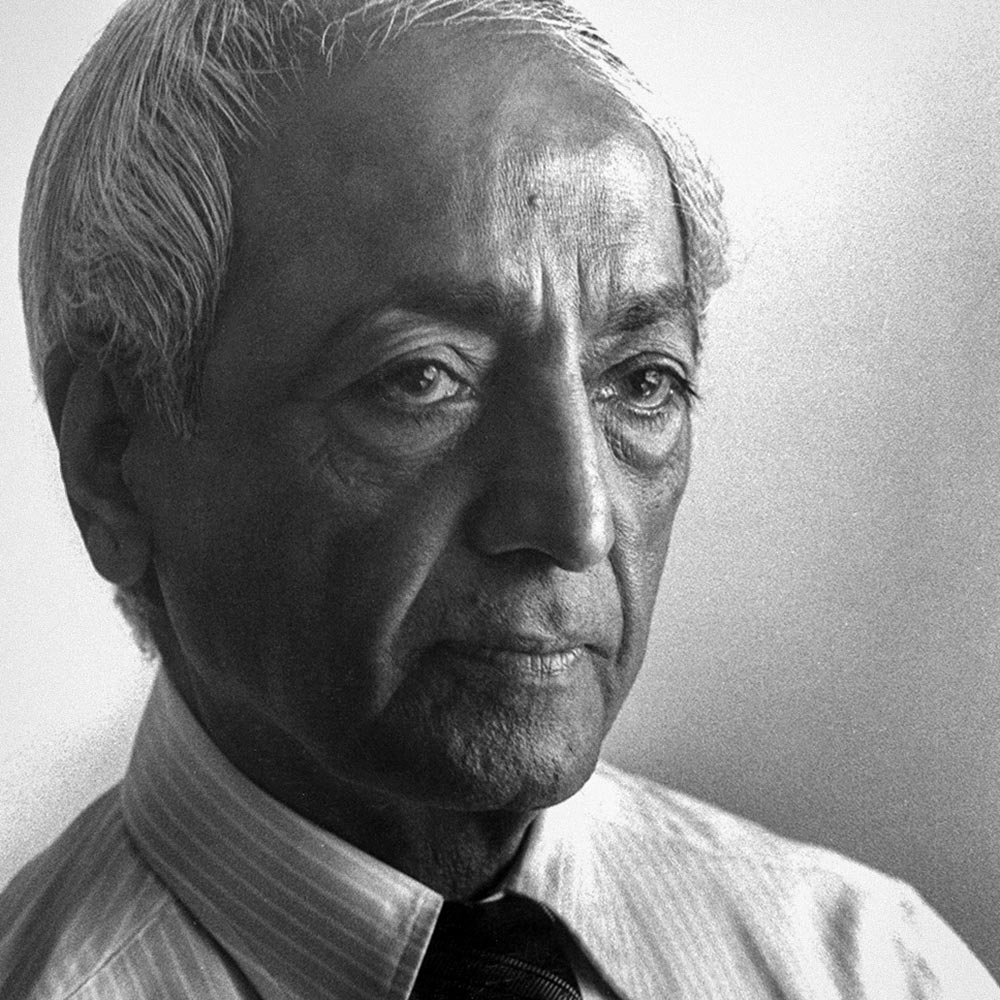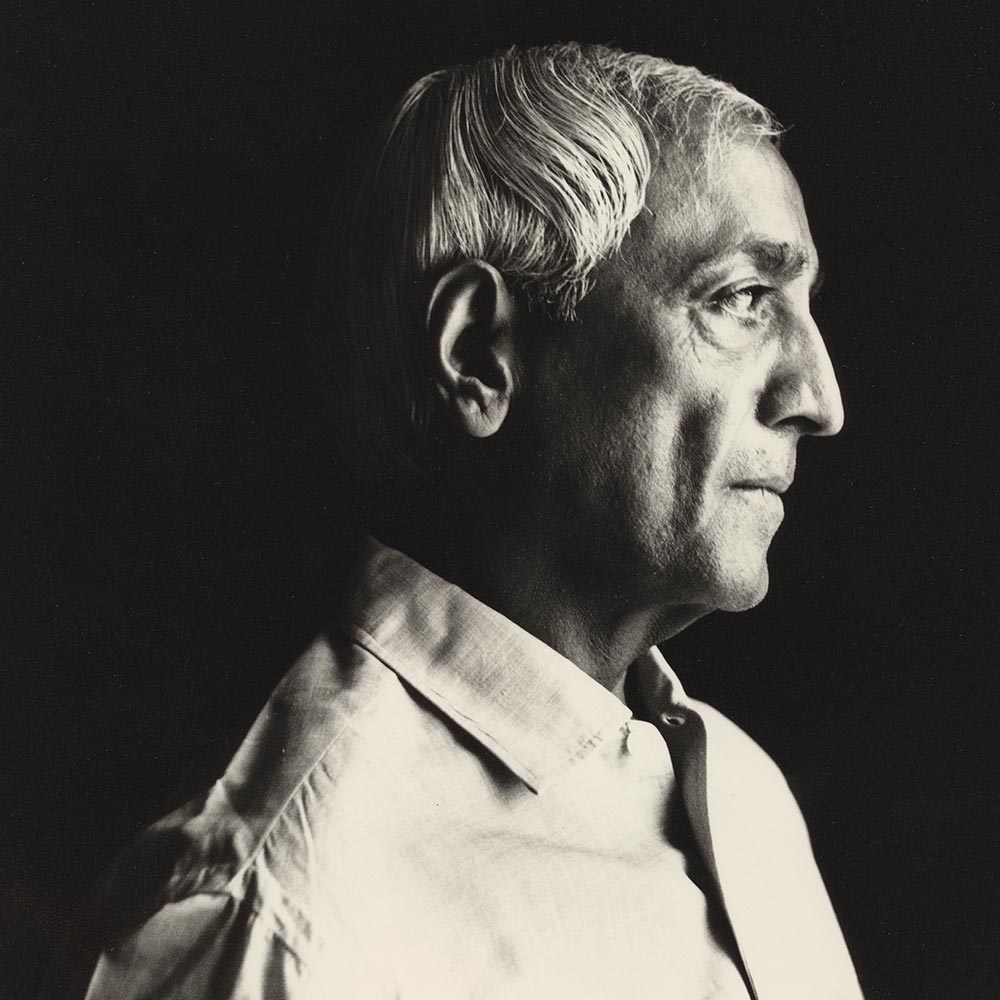The pursuit of security creates authority, and that is why you become a slave, a cog in a machine, living without the capacity to think and create.
Krishnamurti, Life Ahead
Read More
You are controlled by tradition. Tradition tells you what to do, and tradition is knowledge. There are books telling you what to do, the government tells you what to do, your parents tell you what to do, society and religion tell you what to do. And what happens to you? You get crushed, you are just broken. You don’t think, act or live vitally, for you are afraid. You say you must obey, otherwise you will be helpless. Which means what? You create authority because you are seeking a safe way of conduct, a secure manner of living. The pursuit of security creates authority, and that is why you become a slave, a cog in a machine, living without the capacity to think and create. When you paint, generally an art teacher tells you how to do it. You see a tree and you copy it. But to paint is to see the tree and express on canvas or paper what you feel about the tree, what it signifies; the movement of the leaves with the whisper of the wind among them. To do that, to catch the movement of light and shade, you must be very sensitive. And how can you be sensitive to anything if you are afraid and saying, ‘I must do this, I must do that, otherwise what will people think?’ Any sensitivity to what is beautiful is gradually destroyed by authority.
Although most of us are opposed to political tyranny and dictatorship, we inwardly accept the authority or tyranny of another to twist our minds and our way of life.
Krishnamurti, Freedom From the Known
Read More
If there is any form of authority, in the acceptance of that authority there is conformity and following, and that breeds contradiction and disorder.
Krishnamurti, The Awakening of Intelligence
Read More
The ideal has become my authority, and according to that ideal I try to live. What happens? My life becomes a constant battle between what I am and what I should be.
Krishnamurti, Life Ahead
Read More
Political, economic or social revolutions are not the answer, for they produce appalling tyrannies or the mere transfer of power and authority into the hands of a different group.
Krishnamurti, Life Ahead
Read More
Learning only comes into being when there is no fear and when there is no authority.
Krishnamurti On Education
Read More
Freedom of action outwardly depends entirely on a mind that is free from inward authority.
Krishnamurti The Impossible Question
Read More
When there is clarity, there is an end to authority.
Krishnamurti, Commentaries on Living 3
Read More
To be free of all authority, your own and that of another, is to die to everything of yesterday, so that your mind is always fresh, always young, innocent, full of vigour and passion.
Krishnamurti, Freedom From the Known
Read More
To question spiritual authority – whether Christian authority or the authority of Islam with their book, or your guru with his statements – to question it, to doubt it, is to rely entirely on yourself, be a light to oneself, and that light cannot be lit by another.
Krishnamurti, Mind Without Measure
Read More
There is no method or system by which the mind can be set free from authority and tradition; if there were, the system would become the dominating factor.
Krishnamurti, Commentaries on Living 3
Read More
The moment one is a light to oneself, all authority is gone, including the authority of the Gita, the gurus and the ashrams.
Krishnamurti, Explorations and Insights
Read More
The moment we discard authority, we are in partnership, and only then is there cooperation and affection.
Krishnamurti, Education and the Significance of Life
Read More
I am neither your authority nor your guru. If you insist on following, if you insist on listening in order to try to learn what he is saying, then there is no relationship.
Krishnamurti, The Awakening of Intelligence
Read More
Intelligence has no authority. It is not your intelligence or my intelligence.
Krishnamurti, The Whole Movement of Life Is Learning>
Read More
These quotes only touch on the many subjects Krishnamurti inquired into during his lifetime. His timeless and universal teachings can be explored using the Index of Topics where you will find texts, audio and video related on many themes. Another option is to browse our selection of curated articles or more short quotes. Krishnamurti’s reply when asked what lies at the heart of his teachings can be found here. Many Krishnamurti books are available, a selection of which can be explored here. To find out more about Krishnamurti’s life, please see our introduction and the biography. We also host a weekly podcast, and offer free downloads. Please visit our YouTube channel for hundreds of specially selected shorter clips. Below, you can learn more about Krishnamurti and our charity which he founded in 1968.

Who Was Krishnamurti?
J. Krishnamurti (1895-1986) is widely regarded as one of the greatest thinkers and religious teachers of all time. He spoke throughout the world to large audiences and to individuals, including writers, scientists, philosophers and educators, about the need for a radical change in mankind. Referring to himself, Krishnamurti said:
He is acting as a mirror for you to look into. That mirror is not an authority. It has no authority, it’s just a mirror. And when you see it clearly, understand what you see in that mirror, then throw it away, break it up.
Krishnamurti was concerned with all humanity and held no nationality or belief and belonged to no particular group or culture. In the latter part of his life, along with continuing to give public talks, he travelled mainly between the schools he had founded in India, Britain and the United States, which educate for the total understanding of man and the art of living. He stressed that only this profound understanding can create a new generation that will live in peace.
Krishnamurti reminded his listeners again and again that we are all human beings first and not Hindus, Muslims or Christians, that we are like the rest of humanity and are not different from one another. He asked that we tread lightly on this earth without destroying ourselves or the environment. He communicated to his listeners a deep sense of respect for nature. His teachings transcend man-made belief systems, nationalistic sentiment and sectarianism. At the same time, they give new meaning and direction to mankind’s search for truth. His teaching is timeless, universal and increasingly relevant to the modern age.
I am nobody. It is as simple as that. I am nobody. But what is important is who you are, what you are.
Krishnamurti
Krishnamurti spoke not as a guru but as a friend. His talks and discussions are based not on tradition-based knowledge but on his own insights into the human mind and his vision of the sacred, so he always communicated a sense of freshness and directness, although the essence of his message remained unchanged over the years. When Krishnamurti addressed large audiences, people felt that he was talking to each of them personally, addressing their own particular problem. In his private interviews, he was a compassionate teacher, listening attentively to those who came to him in sorrow, and encouraging them to heal themselves through their own understanding. Religious scholars found that his words threw new light on traditional concepts. Krishnamurti took on the challenge of modern scientists and psychologists and went with them step by step, discussing their theories and sometimes enabling them to discern the limitations of their theories.
Krishnamurti left a large body of literature in the form of public talks, writings, discussions with teachers and students, scientists, psychologists and religious figures, conversations with individuals, television and radio interviews, and letters. Many of these have been published as books, in over 60 languages, along with hundreds of audio and video recordings.

The Krishnamurti Foundation
Established in 1968 as a registered charity, and located at The Krishnamurti Centre, Krishnamurti Foundation Trust exists to preserve and make available Krishnamurti’s teachings.
The Foundation serves a global audience by providing worldwide free access to Krishnamurti videos, audio and texts to those who may be interested in pursuing an understanding of Krishnamurti’s work in their own lives.
In describing his intentions for the Foundations, Krishnamurti said:
The Foundations will see to it that these teachings are kept whole, are not distorted, are not made corrupt.

